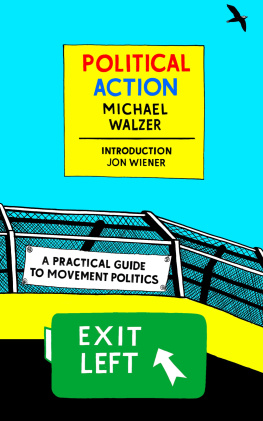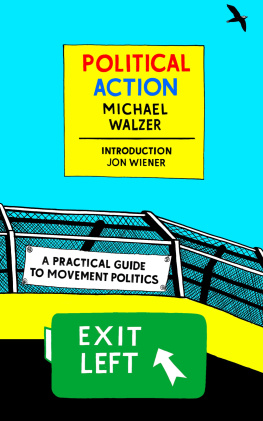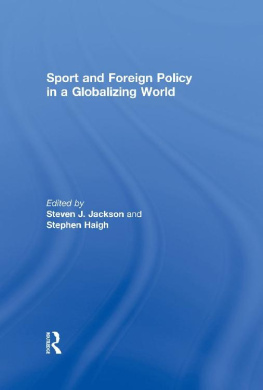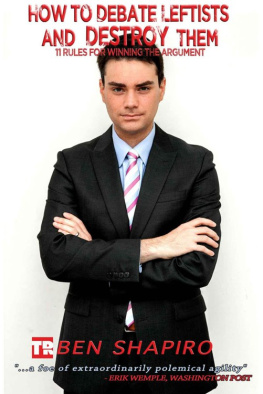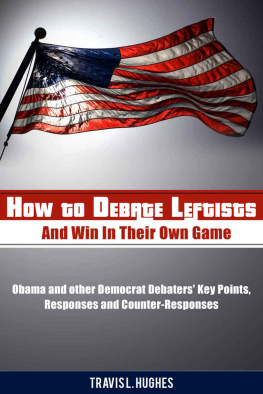A Foreign Policy for the Left
A Foreign Policy
for the Left
Michael Walzer
Yale UNIVERSITY PRESS
New Haven & London
Copyright 2018 by Michael Walzer.
All rights reserved.
This book may not be reproduced, in whole or in part, including illustrations, in any form (beyond that copying permitted by Sections 107 and 108 of the U.S. Copyright Law and except by reviewers for the public press), without written permission from the publishers.
Yale University Press books may be purchased in quantity for educational, business, or promotional use. For information, please e-mail (U.K. office).
Set in Janson Roman type by Integrated Publishing Solutions, Grand Rapids, Michigan.
Printed in the United States of America.
Library of Congress Control Number: 2017942510
ISBN 978-0-300-22387-3 (hardcover : alk. paper)
A catalogue record for this book is available from the British Library.
This paper meets the requirements of ANSI/NISO Z39.48-1992
(Permanence of Paper).
10 9 8 7 6 5 4 3 2 1
For JBW
Contents
INTRODUCTION
The Default Position
ONE
Moments in Time
Getting Things Right and Wrong
TWO
What Is Left Internationalism?
THREE
In Defense of Humanitarian Intervention
FOUR
Is There an American Empire?
FIVE
Global and Domestic Justice
SIX
World Government and the Politics of Pretending
SEVEN
The Left and Religion
The Case of Islam
EIGHT
The Complex Formation of Our Battles
POSTSCRIPT
Can There Be a Decent Left?
Preface
I wrote almost all of this book before the election of Donald Trump, and I made the final revisions in the first months of his administration and in the gloom of leftist expectation. What a Trump administration means for American foreign policy and for international politics is at this moment radically uncertain. But my readers wont, I trust, be living in a different world. The basic issues that men and women of the left need to confront will be the same. Who are our comrades abroad and how can we help them? How should we address the inequalities of international society? When should we oppose, and when should we support, the use of force? How should a mostly secular left address the religious revival?
I have been writing about these kinds of questions for a very long time. As a professor of political theory, I took advantage of the theorists license to defend particular political positions in academic lectures and journals. But I wrote mostly in magazines like Dissent, the New Republic, and the New York Review of Books and sometimes in similar publications in Great Britain, France, and Italy. My subjects have ranged widely, but one recurrent focus of my articles and reviews has been on issues of foreign policy, especially the use of force by the United States, by other states, and by non-state organizations.
Seven of those articles form the basis of this book. I have extensively revised and expanded them, cut out (most of the) repetitions, and added citations and endnotes to pieces that originally appeared without them. Three of the articles were initially written for academic occasions and published in academic journals. But I think their style is only marginally different from that of the four others, which, along with the postscript, were published in Dissent.
My association with Dissent is now more than half a century old. The magazineindependent, left-wing, argumentative, and hostile to every version of authoritarianismis my political home. I helped to edit it for several decades, and I have continued to write for it since retiring as co-editor in 2014. But none of my articles constitutes or reflects a Dissent line. Members of the editorial board and others of our writers have always felt free to disagree.
Like all the Dissentniks, I try to write for the general reader, probably a mythical creature but at any rate not a professor. George Orwells wonderful essay Politics and the English Language is our model: no jargon, no euphemism, no ideological newspeak. We aim at sentences that say, directly, simply, what they mean. I dont always measure up to that standard; none of us do. But I hope readers will recognize the commitmentwhich is also a commitment to democratic discourse, an engagement with our fellow citizens.
Over the years, I have been involved in many political debates, some of them fairly hot. Fierce polemics were a feature of the political world in which I grew up. The aim was to kill your opponentwith arguments, of course, not knives, but the arguments were meant to be lethal. In my old age, I try to argue more quietly, though I still believe that sharp disagreement is a sign of political seriousness. What engaged citizens think and say matters; we should aim to get it right and to defeat those who get it wrong. I understand the very limited impact of what I write, but I continue to believe that the stakes are high.
Many people have helped me think about politics and defend political positions. My political mentors (after my parents, who taught me never to cross a picket line and much more) were the men and women who founded Dissent and wrote for its early issues: Irving Howe, Lew Coser, Stanley and Simone Plastrik, Manny Geltman, Deborah Meier, Bernie Rosenberg, and Michael Harrington. My most active time at Dissent was spent with the next generation: Mitchell Cohen, Maxine Phillips, Mark Levinson, Nick Mills, Joanne Barkan, Jo-Ann Mort, Cynthia Epstein, Ann Snitow, Susie Linfieldand many others, to the third and fourth generations. These people are collectively responsible for all the arguments I make in this book, whether they agree or disagree. The magazine, now ably edited by Michael Kazin, continues to provide political space for arguments like mine and for important disagreements. Michael took time off from editing Dissent to read the manuscript of this book and make many useful, sometimes critical, suggestions, most of which I have accepted.
Among the writers who have had the greatest influence on my more recent political writing, two stand out: Paul Berman and Michael Brub. Berman preceded and guided me in responding to the religious revival and the appearance of Islamist zealotry. Brub has written a brilliant polemic against what he calls the Manichean left and has championed the work of non-Manichean leftists like Stuart Hall and Ellen Willis. I have followed in his tracks.
I have also learned a great deal from two very different sets of friends in Great Britain, the authors of the Euston and Kilburn Manifestos. Norman Geras, Alan Johnson, Shalom Lappin, and Nick Cohen are the Eustonites; Michael Rustin and Stuart Hall are the Kilburnites. Geras and Hall died very recently; they were briefly together at the New Left Review, breaking away for different but equally admirable reasons. I owe a great deal to each of them. But I am most indebted to Michael Rustin, with whom I have been talking about left politics for fifty years.
Finally, I want to acknowledge my friends on the Israeli left, who have had a major impact on my thinkingvisible at many points in this book: Gur and Dalia Ofer, Brian Knei-paz and Bruria Shayshon, the late Dan Horowitz, Janet Aviad, Gary Brenner, Avishai Margalit, Menachem Brinker (who died just as I was finishing this book), Yeri and Shoshana Yovel, Menachem and Nurit Yaari, Ilana Howeold socialists all, like me.
Left politics is, as Irving Howe wrote, steady work. I have a family of steady workers in all the causes of the left. Without their conversation, their support, and their love, I could not have written this or any other book. JBW is my steadiest, smartest, and most lovely comrade.
Next page

